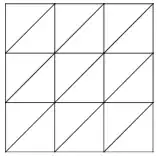I was playing around with double sums and encountered this problem: Evaluate $$\sum_{i=1}^{\infty} \sum_{j=1}^{\infty} \frac{1}{ij(i+j)^2}$$ It looks so simple I thought it must have been seen before, but after using ApproachZero I only found extremely similar variants of the problem:
$\sum_{j=1}^{\infty} \sum_{k=1}^{\infty} \frac{1}{j^2(j+k)^2}$ here
$\sum_{k=1}^{\infty} \sum_{n=1}^{\infty} \frac{1}{n^2k^2(n+k)^2}$ here
$\sum_{n,k \in \mathbb{N_1}} \frac{1}{n^2k^2(n+k)}$ here
Some general facts about $T(r,s,t)=\sum_{u,v=1}^{\infty} \frac{1}{u^rv^s(u+v)^t}$ here
While the last link looks promising, I don't believe that it answers my specific question(but I haven't read the paper fully, only skimmed).
I have an answer to this question(shared Q&A style), but I am curious as to whether there is another way to evaluate the sum. I have been experimenting with double sums for a few weeks now, so many techniques to attack "simple" sums such as this would be much appreciated! In terms of level, I have officially finished a Calculus 2 course but I have self-taught myself Calculus 3 and Complex Analysis, and worked through a few "integration problems" books so any further integral techniques would be fine.
